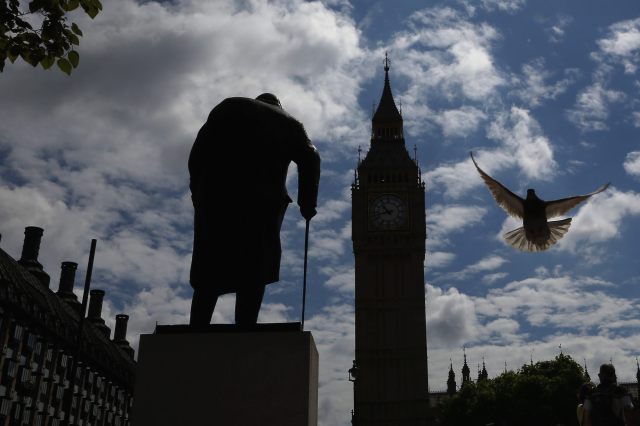Credit: Dan Kitwood / Getty

Easter holds meaning for many – even for those who aren’t religious.
For Christians, it is a celebration of the moment God broke through into recorded time, became incarnate, fulfilled the prophecies of the Old Testament, atoned for our sins on the Cross, and, in the ultimate miracle, conquered sin and death through the resurrection.
Many who aren’t Christian still believe it to be “the greatest story ever told”. They might not be prepared to acknowledge the divinity of Christ, but the story of redemption and atonement nonetheless inspires awe.
This sense stems from the story’s deep connection to our moral identity and our sense of sin and guilt. Humans instinctively yearn for repentance and forgiveness – wanting absolution and a fresh start when we make mistakes.
Secular apologists for the power of the story point to Jung and what he had to say about the hold myths have over us: the endurance of a story is testament to its strength and ‘truth’. Arguably, the Christian understanding of the nature of human responsibility and redemption has never been surpassed in moral philosophy.
Nelson Mandela understood this. When he sought to bring reconciliation to the peoples of South Africa after the apartheid era, he realised that it needed something special. His Truth and Reconciliation Committees brought the victims of racism and oppression face to face with their persecutors in such a way that the oppressors (some of them) repented and the victims (many of them) were able to forgive. Some of the moments of confession and forgiveness during these hearings were among the most moving you will ever hear.
In this way, Mandela managed to draw a line under apartheid, and sowed the seeds for a reconciled society. It was an extraordinary act of political imagination.
In secular Britain, we have almost abandoned the traditions – even the language – of repentance, forgiveness and redemption. Yet we are most certainly in need of reconciliation: reconciliation with our history as a nation, and reconciliation with each other over our different interpretations of that history.
A recurring theme in our national conversation over the past few years (quite heavily embedded in the Brexit debate) has been the shame in some quarters over certain episodes in our history.
In some instances, this is justified. We cannot be anything other than ashamed of our role in the early expansion of the slave trade. The depredations and cruelty of the East India Company in the 17th and 18th centuries have still not been fully laid bare. Our role in waging war on China in order to force them to open their market to the opium trade (which makes the opioid epidemic look like a picnic) is a national disgrace.
We recently commemorated the hundredth anniversary of the Amritsar Massacre, when Brigadier Reginald Dwyer opened fire on up to 1,100 demonstrators with the specific aim of “striking terror” into the Punjab. The Iraq War is one of the most damaging cases of displacement activity in history.
Yet we were also the country which, thanks to William Wilberforce, was the first to bring an end to the slave trade. The British Empire exported democracy and the rule of law to peoples across the globe, and our withdrawal from Empire was one of the speediest, most dignified and peaceful of all imperial retreats. (The enduring loyalty and friendship of the British Commonwealth is testament to our legacy). Countries from all over the world honour and respect us for the role we played in defending freedom against the Nazis.
Our imperial history, though, is contested ground. According to a recent YouGov poll, 59% think the Empire is something to be proud of, 19% something to be ashamed of. That is a significant minority who only feel shame for our country’s past.
The shame narrative was embodied in the recent assault on the memory of Winston Churchill, in which he was described as a “white supremacist and mass murderer”. It is also a motivator for those people around Labour leader Jeremy Corbyn, such as Seamus Milne. It is an undercurrent of Jon Snow’s “I have never seen so many white men in one place” Channel 4 News.
Is it not time to bring both sides of the debate together? We can all repent of the episodes which are a source of shame but celebrate the achievements of which we can be proud.
Our national history should not be a source of such polarisation. A little truth telling from both sides would bring us to a more settled understanding which embraces both those things which we can celebrate along with the “crimes, follies and misfortunes” which stain the history of all countries and communities.
To progress, an individual must let go of those things holding them back. They must let these die, so that something new can be born. So too a nation.
We already have a National Remembrance day. But this is a day of mourning for those we lost. Perhaps we could introduce a new Day of Reconciliation. It could be called British History Day.
We could celebrate Magna Carta, Wilberforce, the liberation of Europe. But we can also commemorate the episodes of which we are ashamed – the slave trade, the East India Company, the Opium Wars. We could bring together all parts of the community to acknowledge the ‘sins’ of the past and make peace. Might it bring healing?










Join the discussion
Join like minded readers that support our journalism by becoming a paid subscriber
To join the discussion in the comments, become a paid subscriber.
Join like minded readers that support our journalism, read unlimited articles and enjoy other subscriber-only benefits.
Subscribe